PERSONAL
3,376
Sindrel Song - Climbing The Mountain
6 years ago
I've done quite a bit of work on Sindrel Song recently, but haven't talked about it properly in a while. So here I'll talk about aspects of the writing, and how I've attempted to make the multiple attempts required to complete each song satisfying rather than off-putting.
A brief personal note, first: Yesterday I moved out of the holiday cottage I'd spent a couple of weeks in alone. It didn't exactly go as planned, because the first week was a mess of stress due to all the website stuff (which I still haven't fully resolved, since so much remains to be restored), and during the second week I was even more tired than I have been in weeks, probably as a result of that stress. Still, I wish I had a place of my own on a more permanent basis. But that costs money, which I don't have. Hopefully that'll change in the near future though.
But anyway. Sindrel Song! I've been working on this almost every day, with what little energy I have, because it feels like the most direct route to making at least
some money. I mean, it'll probably only end up earning a pittance and fading into obscurity... but
it might not!! So it seems more worthwhile to focus on this than, say, spending what little time and energy I have thinking about the other things I should focus on, like restoring my websites. Progress is slow though because of how tired I've been. Do you know how annoying it is being tired all the time? It is very annoying, that's how annoying it is. Probably more annoying than that, actually. Or it would be if I wasn't too tired to feel annoyed.
Rhythm games - in my experience at least - are mostly a test of visual reflexes; you see the 'notes' coming, and have to react in time. Sindrel Song, by contrast, is more a test of cognitive memory. It uses different mental and physical processes, which makes it maybe more taxing, more difficult, but hopefully particularly satisfying.
I've also noticed that it's normal for rhythm games to be easy enough that you can complete stages in your first attempt, often receiving a high grade/rating at the end. Challenge is handled by providing multiple difficulty levels for the same songs, which have different arrangements of 'notes' (usually more of them).
I played a VR rhythm/dancing game recently which works like this. It has eight levels, each with three stages, each with three difficulties. In my naive, tired, half-hearted foray into the game, I was able to clear all stages I attempted, in Easy mode, on my first try, generally getting A and A+ grades at the end. I suppose that's meant to be satisfying to people, to feel good about yourself for being an immediate master, but for me it just felt quite boring, like I didn't even have to put in the effort because what would it have mattered anyway, and it didn't give me any motivation to try again on a harder difficulty. The songs were over so quickly that I can't remember any of them at all.
I mention this because a big part of Sindrel Song is that the songs are quite challenging, since they rely on memory rather than reflex, and you have a limited number of lives before you fail and have to start again. That means that each stage takes several attempts to get through.
Personally, I really like this, and I've played other games with similar bits that activated my mind and made my hands sweat in a way unlike the other sections of the same games with little to no consequences for failure. Two recent examples that come to mind are sections of the Switch games Mario Odyssey and Breath of the Wild. In the former, there's a long, difficult challenge at the end with no checkpoints, meaning if you die (and it's easy to die), you have to start the whole long ordeal again. I didn't have the energy to do more than one or two attempts a day, since so much of it ended up just being repetition, only to finally arrive at an unfamiliar bit after like ten minutes and then die instantly, but I did keep coming back to it over several days, and it was incredibly satisfying to finally complete. Breath of the Wild has a DLC thing where you have to complete a number of challenges back-to-back without a chance to save or heal, and with all your equipment taken away, which was a similar emotional experience. Frustrating, repetitive, but ultimately more satisfying than something I'd be able to forgettably finish in my first attempt.
Though those experiences required much repetition of sections I'd already completed, it's interesting how my aptitude at those sections increased dramatically through repetition. While first attempts might have been hair-raising and anxiety-provoking, I breezed through later attempts in a fraction of the time, driven by fluid competence. There's satisfaction in that, too.
But one of the frustrating things about them was not knowing exactly how far along I was. Did I just die very close to the end? Was I half way, with loads more to go? How many more times must I endure this repetitive intro bit that I've long since mastered?
![]()
In Sindrel Song, the percentage completion of each stage - initially added as a kind of afterthought that popped up for a second if you failed - has become a key part of the experience. When you finish a level - either through completion or failure - you're shown this graph:
![]()
That is, a star appears for your current completion percent, and you can see all previous attempts, allowing you to visually track your progress.
There's a distinction made between completion and mastery. You can
complete a level simply by making it to the end, and rhythm doesn't matter for this at all; you can play all the notes in a melody segment with whatever horrible rhythm you want, and you'll pass that section as long as you've sung the right notes in the right order. But the closer your rhythm matches the rhythm you just heard, the greater the rating for that segment. If you finish the song, these ratings are taken into account to calculate percentages greater than 100%. To get 200%, you need to get the best rating on every segment in that song. (When calculating scores above 100%, each failure knocks off 20%, so if you survive with just one life out of six left, you get a score of 100% regardless of your rhythm ratings. Perfect performance apart from one lost life would give 180%.)
(Also, changing the icons for the ratings - from things like 8D as they are now, to something that doesn't distract from the lyrics, which appear on that bar as text - and adding those icons to the bar at the side here, rather than just having coloured boxes, is on my To Do List.)
Annoyingly, I've mastered all the songs in the game myself, and I can't
unlearn them either. To get those lower percentages there, I had to fail on purpose. When I tried each level at first, it genuinely took me several attempts to complete them, and I remember the shaky, hand-sweating, adrenaline-fuelled feeling I had when getting towards the end and having to really focus so then I didn't mess up and have to start again. I hadn't added this graph system at that point, but I really wish I had, because I would have loved to have seen my proper attempts graphed in this way. I'll be curious to see the graphs for the testers.
You view these graphs at the end of the stage, but you can also view the graph for any stage directly from the world map:
![]()
The progress percentage is also clearly shown for each node, as both a number and a radial bar (which distinguishes between purple completion and yellow mastery - those two colours, and day/night, light/dark, are recurring motifs).
I currently don't have selectable difficulty levels for the stages, but this completion/mastery system adds a kind of variable difficulty. Merely
passing a stage is so different to becoming so good at it that you can achieve the top score, giving more replay value.
I've been having to write the dialogue recently, and I've planned it in a fairly formulaic way for each character which ties it strongly to this completion percentage system.
You can visit stages either to attempt the song,
or simply to talk with the character there. Hearth's node is the first one, but you can't actually play his song until all the others are completed. Instead, you can go there whenever you like (between songs, obviously) to ask him about any lore or gameplay concepts you'd like to learn about. (His is the 0% node there.)
When you visit a stage, you get a conversation menu like this (after a greeting, which is longer the first time you meet them):
![]()
The first option obviously allows you to attempt their song.
The third option, "How do you feel about the other sindrels?", only appears when you've completed the stage at least 100% (except for Hearth, who has this option available from the start). You can ask them about any of the sindrels you've already met, meaning that once you meet a new one, you can go back to all the others and ask how they feel about them, if you want. They have a little bit to say about each one; not loads, but enough to, I hope, deepen the feelings of connection the player has to these characters, and the sense of connection they have with one another. It seems like it'd accentuate the fact that they're all part of a group together, and it'd be interesting to explore how their different philosophies mesh or clash.
The second option, "I want to talk about you...", is the one that ties in most to the completion percentage. Each character has a 'story' in six parts, which are unlocked at the following percentages: 20%, 40%, 70%, 100%, 150%, 190%. When a new one's available, that red notification dot makes you aware of it. I've done this same kind of thing before in games like MARDEK and Taming Dreams, where progress unlocks new dialogue section, which is deeper and more personal the more you unlock (I think it was a character's level that unlocked their story in MARDEK?). People seemed to like that, and I certainly do, so hopefully this'll give people a reason to keep trying to improve their completion percentage. The characters talk about their backstories, how they became wintrels, but they all share their philosophies about life and death too, since the whole reason Glimmer is talking and singing with them is to decide whether or not she wants to live forever, despite her broken mind.
Speaking of which, her defective symboliote speaks:
![]()
(I like that font because it's suitably erratic and chaotic, while also being feminine rather than the kind of font a serial killer might use to carve into their victims' flesh, but if people struggle to read it, I'll have to reluctantly change it.)
Previously, Glimmer didn't speak at all in this, beyond blandly-worded functional conversation options. But Glimmer has been a character, in various incarnations, for a while, and she's always had a distinct voice. I've been intending since the beginning to incorporate that voice into this game in some way, and I definitely wanted her 'broken mind' to be a case of showing and not just telling.
It's a strange voice, though. It's derived from the one I gave Solaar, years ago in MARDEK, which I don't remember having any specific thoughts behind at the time. It's fortunately fitting now, though, because if her symboliote is defective, then it makes sense that the language ability it's granted her would be eccentric and jumbled. Since it's her 'mind', and it gave her the ability to speak, it'd make sense for the symboliote to have the same 'voice' as her, too, so it does. But it's quite challenging to write, so she doesn't say very much (though she hardly seems like the chatty type anyway).
I'm currently working my way through writing all the dialogue. There are fifteen little bits for each character (first time meeting, first 100% completion (which unlocks the next stage), six unlockable sections, six opinions of other sindrels (you can ask them how they feel about themselves), and a bunch of briefer 'functional comments' for things like saying hello, goodbye, responding to failure, etc). I wrote all of Remedy's and most of Hammer's in a day - it took about fifteen minutes for one bit, which are between 20 and 50 lines long - but I haven't done more because of tiredness. It's difficult to produce new things while exhausted, it seems, which is why I've been mostly doing things like bug fixes which don't require any subjectivity or imagination.
Another writing-related feature that I also included in previous games is an enyclopaedia, or "LORE" as it's called in this.
![]()
What an exciting image that is.
There'd be sections for each of the sindrels, plus some for world concepts like the aster, house plants, the Aolmna, etc. To learn about those single concepts, you'd first hear about them in conversation, then you'd go and ask Hearth about them (he has an additional conversation option for this), at which point they unlock in this section. Each of those would have a short paragraph written about it, accompanied sometimes by an image.
The pages about the sindrels would be more complicated though. Rather than providing a short, single description, instead they're updated whenever you unlock more of their story, or ask them their opinions about the other sindrels.
![]()
![]()
So I have to write these too, though that shouldn't be as difficult or involved as writing the conversation stuff.
Here's a lore thing I came up with recently, which is mentioned there: Male sindrels are called
imis, and females are called
owos. I kept referring to them as 'males' and 'females' previously, which felt impersonal and weird, but terms like 'girl' and 'woman', or 'boy' and 'man', suggest a kind of development that doesn't apply to sindrels, so they didn't feel right either. Is Remedy there a girl, or a woman? Neither, really. I chose 'imi' and 'owo' carefully. 'M' and 'W' suggest 'man' and 'woman', and I like fact that they're visually the same but inverted. The 'i' in 'imi' is fairly sharp and harsh for a vowel sound, and it visually looks kind of like the blades that the males use. By contrast, 'owo' sounds softer and rounder, and looks rounder too, and the 'o' is reminiscent of their round gems (they only have one, but I wanted the two words to have matching letter arrangements). Also owo is a cutesy emote with a cat mouth, and sindrels' mouths are kind of cat-like anyway. Since a lot of the sindrels' world revolves around sex/gender roles, I also hope that using these more alien terms might create some psychological distance from real genders so then people might be more inclined to accept and explore what it is they're meant to represent... rather than, say, taking immediate issue with 'females' looking after their homes, because 'women shouldn't be forced to stay in the kitchen, you sexist!!' (as if that's even what it's saying, but that's how a lot of people think, isn't it?).
![]()
So that's some of the stuff I've added to the game recently, and some that I'm working on at the moment. I want to start testing after the writing's done, but the writing is going to be a big part of the experience, especially unlocking it, which is why I want to have at least a first draft of it done first.
The writing isn't exactly
funny though. I get the feeling that some kind of lazy but relatable parody, text littered with obvious
jokes, might be what a lot of people would prefer, but that wouldn't really fit. It's not like I take myself overly seriously in anything that I write, so it's still got my voice about it all, but it not being overtly comical has been something I've been aware of as I write. I'll see how it goes. If it's funny, it's mostly stuff like the nature of Glimmer's voice, which isn't the kind of punchline-based
joking, but which (to me at least) is amusing in its oddness regardless. I suppose the characters have more ~heartfelt conversations~ rather than exchanging banter, because I'm far more familiar with the former than the latter, and I wonder how people might respond to that.
It feels like I've been dragging Sindrel Song out for ages, but I started on the 27th of December, which wasn't very long ago, considering how far along I've come and how ill I've been throughout. I'm so close to the end now that it seems best to focus on finishing it off, though I can't predict how long that'll take...





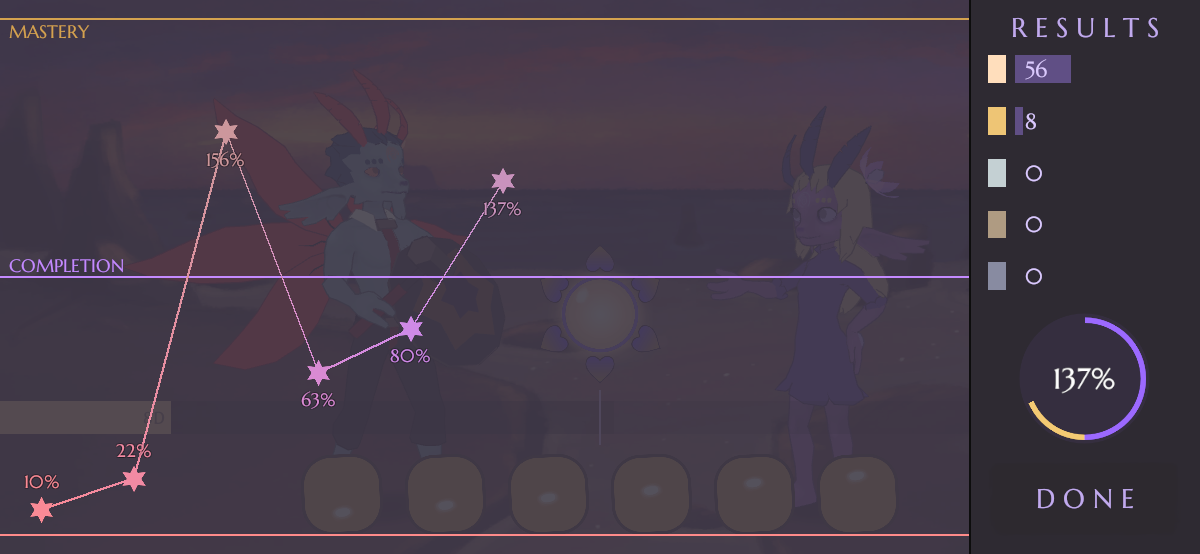
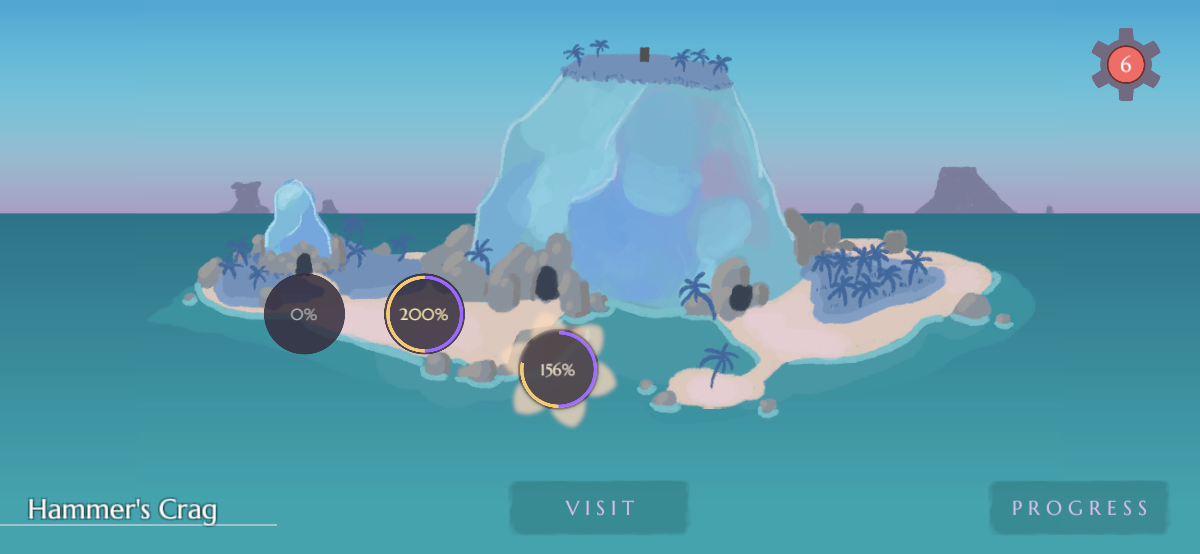
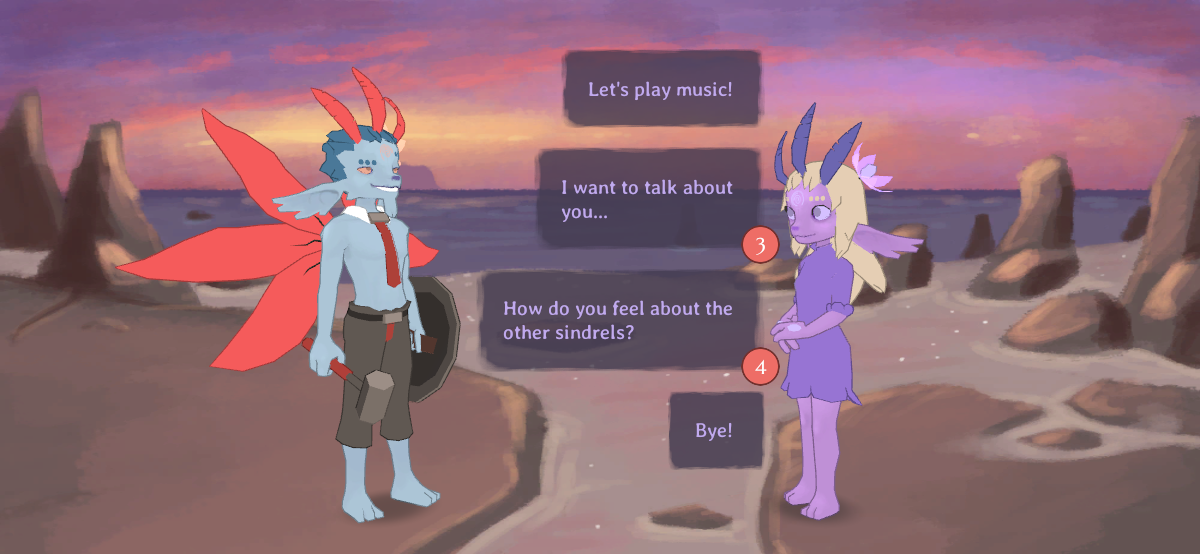
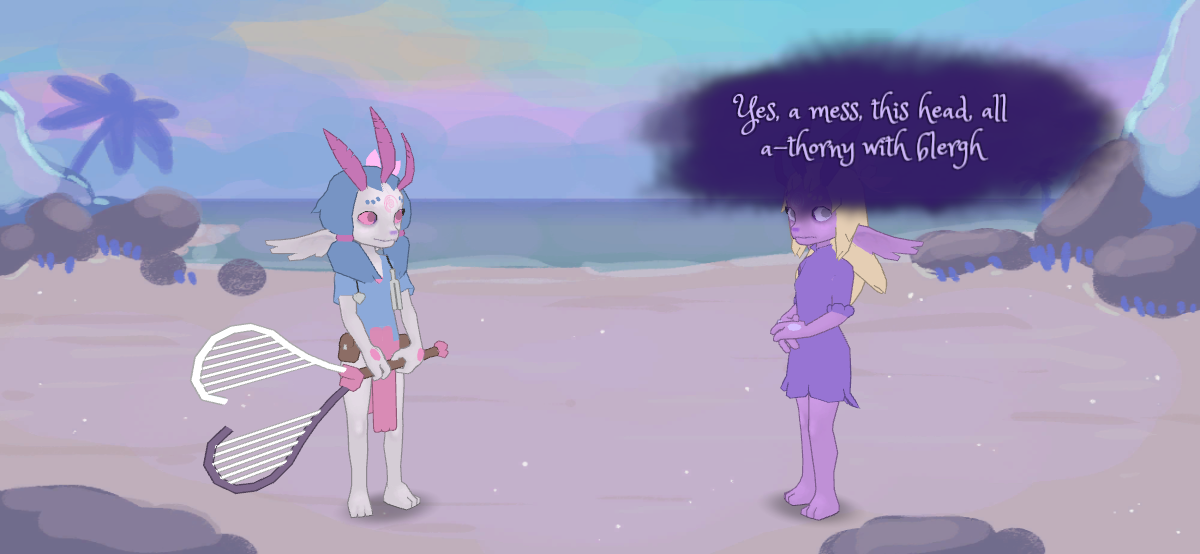
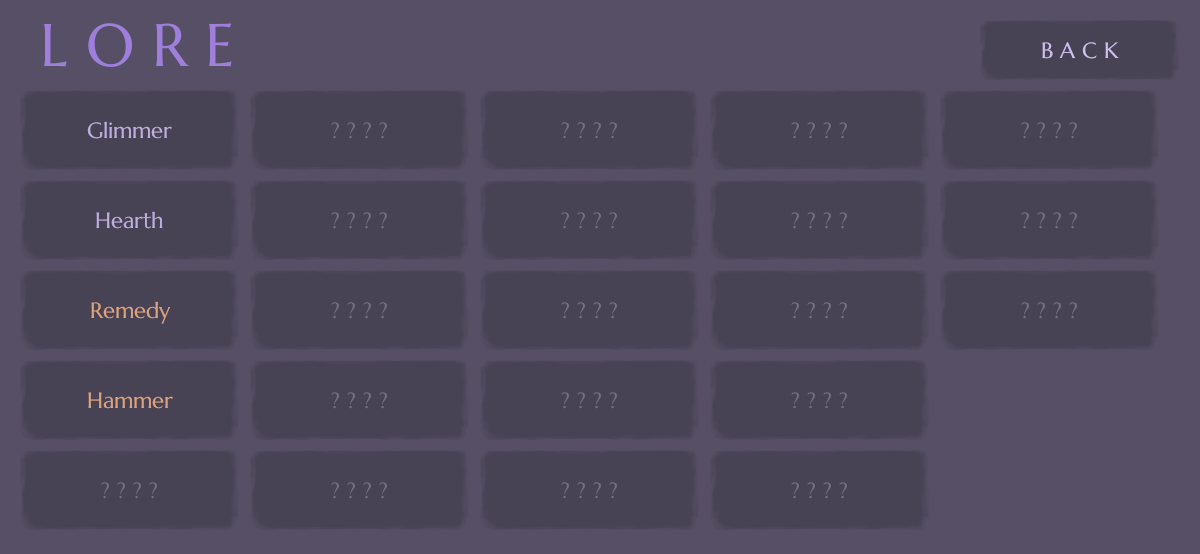
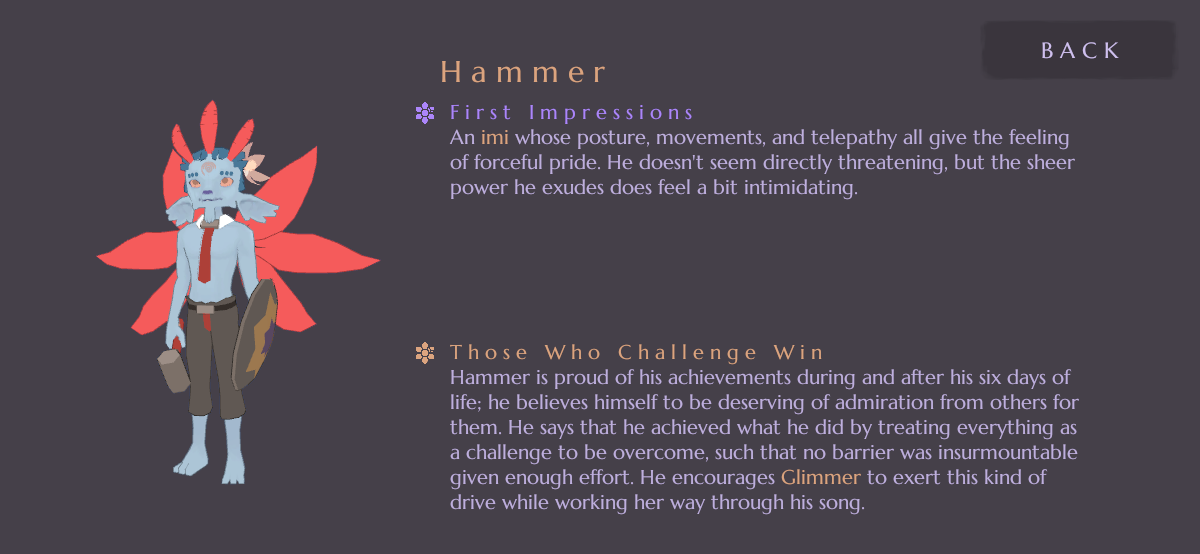
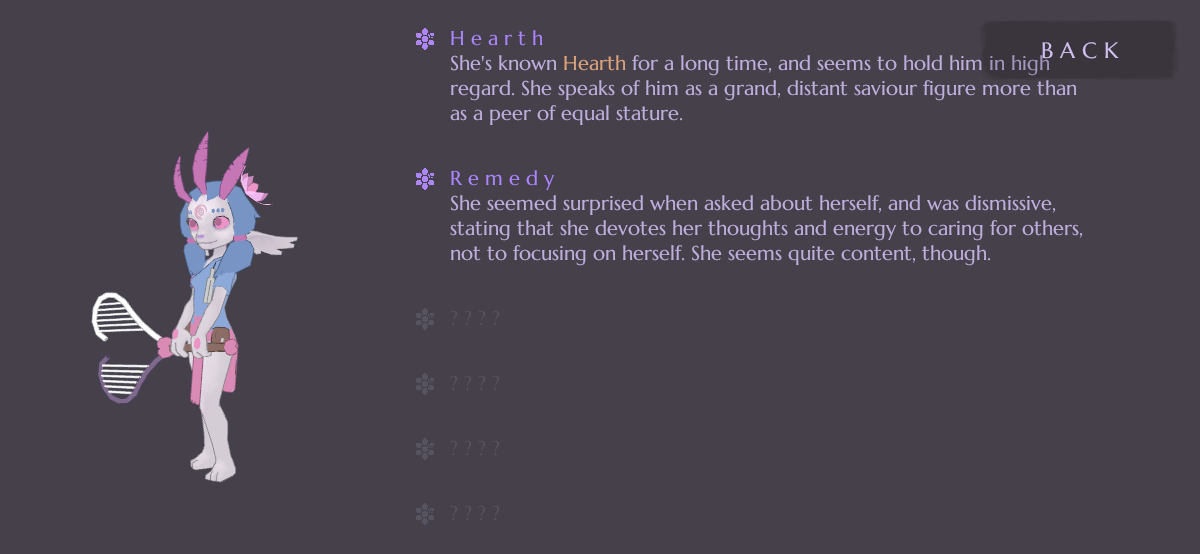
0